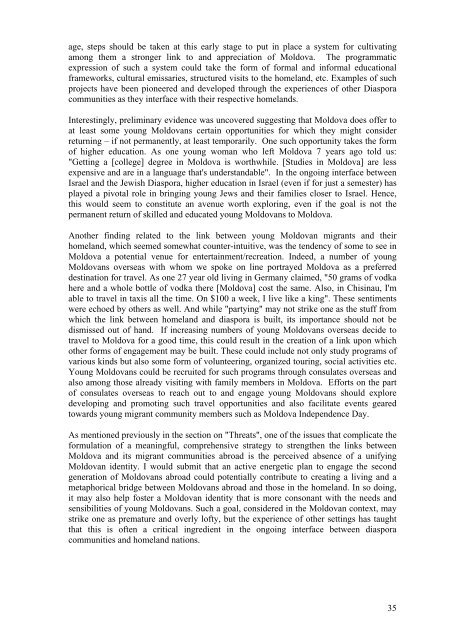Exploring the Link between Moldovan Communities Abroad ... - Iom
Exploring the Link between Moldovan Communities Abroad ... - Iom
Exploring the Link between Moldovan Communities Abroad ... - Iom
Create successful ePaper yourself
Turn your PDF publications into a flip-book with our unique Google optimized e-Paper software.
age, steps should be taken at this early stage to put in place a system for cultivatingamong <strong>the</strong>m a stronger link to and appreciation of Moldova. The programmaticexpression of such a system could take <strong>the</strong> form of formal and informal educationalframeworks, cultural emissaries, structured visits to <strong>the</strong> homeland, etc. Examples of suchprojects have been pioneered and developed through <strong>the</strong> experiences of o<strong>the</strong>r Diasporacommunities as <strong>the</strong>y interface with <strong>the</strong>ir respective homelands.Interestingly, preliminary evidence was uncovered suggesting that Moldova does offer toat least some young <strong>Moldovan</strong>s certain opportunities for which <strong>the</strong>y might considerreturning – if not permanently, at least temporarily. One such opportunity takes <strong>the</strong> formof higher education. As one young woman who left Moldova 7 years ago told us:"Getting a [college] degree in Moldova is worthwhile. [Studies in Moldova] are lessexpensive and are in a language that's understandable". In <strong>the</strong> ongoing interface <strong>between</strong>Israel and <strong>the</strong> Jewish Diaspora, higher education in Israel (even if for just a semester) hasplayed a pivotal role in bringing young Jews and <strong>the</strong>ir families closer to Israel. Hence,this would seem to constitute an avenue worth exploring, even if <strong>the</strong> goal is not <strong>the</strong>permanent return of skilled and educated young <strong>Moldovan</strong>s to Moldova.Ano<strong>the</strong>r finding related to <strong>the</strong> link <strong>between</strong> young <strong>Moldovan</strong> migrants and <strong>the</strong>irhomeland, which seemed somewhat counter-intuitive, was <strong>the</strong> tendency of some to see inMoldova a potential venue for entertainment/recreation. Indeed, a number of young<strong>Moldovan</strong>s overseas with whom we spoke on line portrayed Moldova as a preferreddestination for travel. As one 27 year old living in Germany claimed, "50 grams of vodkahere and a whole bottle of vodka <strong>the</strong>re [Moldova] cost <strong>the</strong> same. Also, in Chisinau, I'mable to travel in taxis all <strong>the</strong> time. On $100 a week, I live like a king". These sentimentswere echoed by o<strong>the</strong>rs as well. And while "partying" may not strike one as <strong>the</strong> stuff fromwhich <strong>the</strong> link <strong>between</strong> homeland and diaspora is built, its importance should not bedismissed out of hand. If increasing numbers of young <strong>Moldovan</strong>s overseas decide totravel to Moldova for a good time, this could result in <strong>the</strong> creation of a link upon whicho<strong>the</strong>r forms of engagement may be built. These could include not only study programs ofvarious kinds but also some form of volunteering, organized touring, social activities etc.Young <strong>Moldovan</strong>s could be recruited for such programs through consulates overseas andalso among those already visiting with family members in Moldova. Efforts on <strong>the</strong> partof consulates overseas to reach out to and engage young <strong>Moldovan</strong>s should exploredeveloping and promoting such travel opportunities and also facilitate events gearedtowards young migrant community members such as Moldova Independence Day.As mentioned previously in <strong>the</strong> section on "Threats", one of <strong>the</strong> issues that complicate <strong>the</strong>formulation of a meaningful, comprehensive strategy to streng<strong>the</strong>n <strong>the</strong> links <strong>between</strong>Moldova and its migrant communities abroad is <strong>the</strong> perceived absence of a unifying<strong>Moldovan</strong> identity. I would submit that an active energetic plan to engage <strong>the</strong> secondgeneration of <strong>Moldovan</strong>s abroad could potentially contribute to creating a living and ametaphorical bridge <strong>between</strong> <strong>Moldovan</strong>s abroad and those in <strong>the</strong> homeland. In so doing,it may also help foster a <strong>Moldovan</strong> identity that is more consonant with <strong>the</strong> needs andsensibilities of young <strong>Moldovan</strong>s. Such a goal, considered in <strong>the</strong> <strong>Moldovan</strong> context, maystrike one as premature and overly lofty, but <strong>the</strong> experience of o<strong>the</strong>r settings has taughtthat this is often a critical ingredient in <strong>the</strong> ongoing interface <strong>between</strong> diasporacommunities and homeland nations.35
















